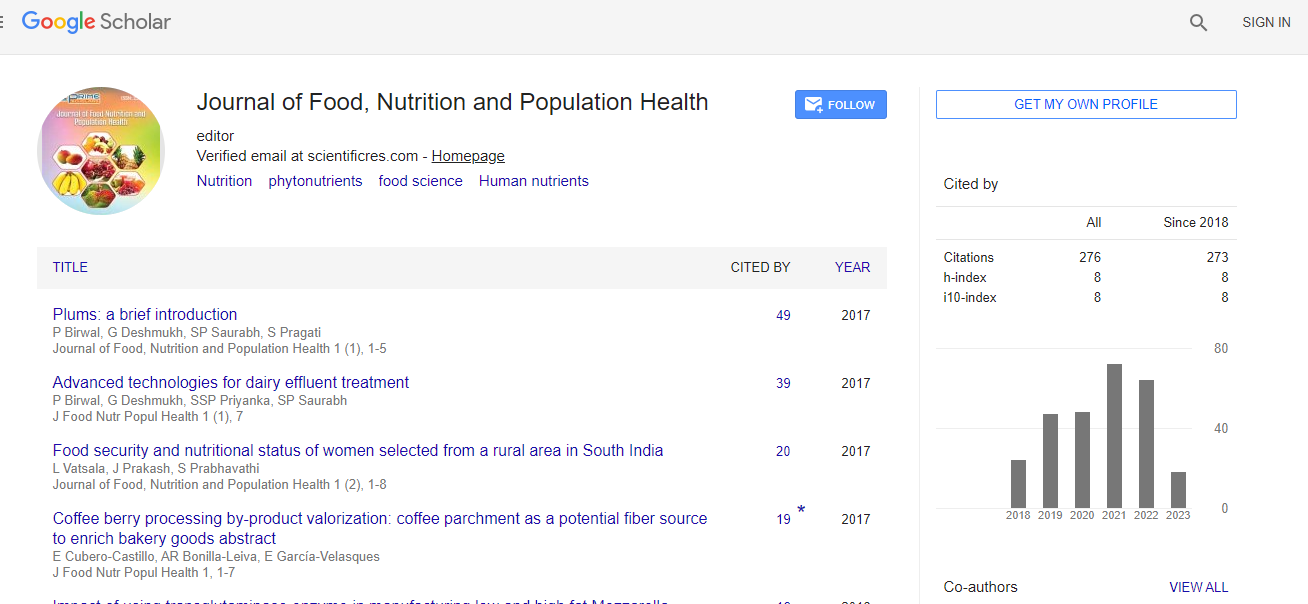Commentary - (2024) Volume 8, Issue 3
Maternal Dietary Care in Hospitals: Ensuring Optimal Health for Mothers and Their Newborns
Yu Zhang*
Department of Neonatal, Fudan University, China
*Correspondence:
Yu Zhang,
Department of Neonatal, Fudan University,
China,
Email:
Received: 02-Sep-2024, Manuscript No. IPJFNPH-24-21228;
Editor assigned: 04-Sep-2024, Pre QC No. IPJFNPH-24-21228 (PQ);
Reviewed: 18-Sep-2024, QC No. IPJFNPH-24-21228;
Revised: 23-Sep-2024, Manuscript No. IPJFNPH-24-21228 (R);
Published:
30-Sep-2024, DOI: 10.21767/2577-0586.8.3.24
Description
Maternal dietary care in hospitals is a critical aspect of
ensuring the health and well-being of both mothers and their
newborns. The nutritional needs of women during pregnancy
and the postpartum period are unique and require specialized
attention to support the complex physiological changes
occurring in their bodies. Proper dietary care can influence
recovery, breastfeeding success, and overall maternal and
infant health. This article explores the importance of maternal
dietary care in hospitals, key nutritional considerations, and
best practices for providing optimal support. After childbirth, a
mother’s body undergoes significant physical stress and needs
to repair tissues and restore energy levels. Adequate nutrition
is crucial for wound healing, replenishing lost blood, and
restoring overall strength. Childbirth can be exhausting, and
proper nutrition helps combat fatigue by providing essential
nutrients and energy. A well-balanced diet supports optimal
milk production and quality. Essential nutrients like proteins,
vitamins, and minerals are crucial for producing nutrient-rich
breast milk. The nutritional quality of breast milk directly
impacts the health and development of the newborn. Proper
maternal nutrition helps prevent deficiencies that can lead to
complications such as anemia, poor lactation, and weakened
immune function. Emerging evidence suggests that balanced
nutrition may play a role in reducing the risk of postpartum
depression and supporting mental health. Essential for tissue
repair and milk production. Sources include lean meats,
dairy products, eggs, and plant-based options like legumes
and nuts. Provide energy and help manage fatigue. Whole
grains, fruits, and vegetables are preferred for their fiber
and nutrient content. Necessary for hormone production
and overall health. Healthy fats from avocados, nuts, seeds,
and fatty fish should be included in the diet. Important for
replenishing blood loss and preventing anemia. Found in red
meat, spinach, and fortified cereals. Supports bone health and,
in the case of breastfeeding mothers, helps ensure adequate
calcium levels in breast milk. Sources include dairy products,
fortified plant milks, and leafy greens. Adequate hydration
is crucial for maintaining energy levels and supporting milk
production. Water should be the primary beverage, with
additional fluids from soups and herbal teas. Nutritional needs
should be assessed on an individual basis, considering factors
such as medical history, dietary preferences, and any specific
health conditions. Meals should respect cultural practices and
personal preferences to enhance satisfaction and compliance.
Educate mothers about the importance of specific nutrients
and how to maintain a balanced diet. This can empower them
to make informed choices during their hospital stay and after
discharge. Offer guidance on meal planning and nutrition for
breastfeeding, including how to manage dietary restrictions if
necessary. Ensure that hospital meals are balanced, providing
a mix of proteins, carbohydrates, and fats, along with essential
vitamins and minerals. Meals should be visually appealing
and flavorful to enhance appetite and satisfaction. Monitor
dietary intake and adjust meal plans based on individual
needs, preferences, and recovery progress. Be proactive in
addressing any dietary concerns or complications, such as food
intolerances or gastrointestinal issues. Involve family members
in dietary planning and education, as they can provide
additional support for the mother’s nutritional needs once she
returns home. Maternal dietary care in hospitals plays a vital
role in supporting the health and recovery of new mothers
and their newborns. By focusing on individualized nutrition,
providing education, and ensuring a variety of high-quality
meals, healthcare providers can significantly enhance maternal
and infant well-being.
Acknowledgement
None.
Conflict Of Interest
None.
Citation: Zhang Y (2024) Maternal Dietary Care in Hospitals: Ensuring Optimal Health for Mothers and their Newborns. J Food Nutr Popul Health. 8:24.
Copyright: © 2024 Zhang Y. This is an open-access article distributed under the terms of the Creative Commons Attribution License, which permits unrestricted use, distribution, and reproduction in any medium, provided the original author and source are credited.

